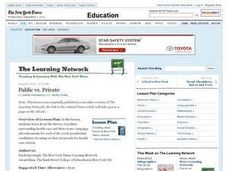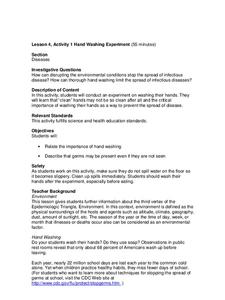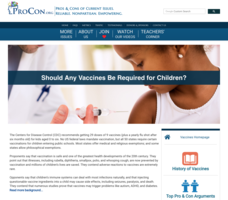Baylor College
Drugs, Risks and the Nervous System
In cooperative groups, middle schoolers contemplate the probability of 18 different situations occurring. After they make predictions, they compare them to the actual risk factors. This eye-opening exercise demonstrates that the odds of...
Curated OER
Human Body Series - Cardiovascular System
Pump up your class while studying the cardiovascular system with this pair of activities. In one, learners record heart rates during different actions. In the second, they read kid-friendly heart health articles online and then write a...
Baylor College
Tools of Magnification
Life science learners need to be able to use a microscope. With this comprehensive resource, they first experience how lenses and magnification work, and then get familiar with using a compound microscope. Tremendous background...
Curated OER
Public vs. Private
Students watch two commericals from previous presidential elections on the topic of healthcare. After reading an article, they identify the position of the various candidates for the 2008 election. In groups, they brainstorm their own...
World Health Organization
Sun Protection
Primary graders become sun scientists and conduct experiments to learn about the beneficial and harmful effects of the sun and UV radiation. They also investigate their personal sunburn danger zones and learn about how to protect...
Population Connection
The Peopling of Our Planet
How many people live on the planet, anyway? The first resource in a six-part series covers the topic of the world population. Scholars work in groups to conduct research and make population posters after learning about the global...
Curated OER
Search for a Safe Cigarette
Students review a range of federal and state actions on tobacco issues and consider the government's role in public health. They discuss current labeling and how the law should interpret it.
Centers for Disease Control and Prevention
Hand Washing Experiment
An engaging experiment allows scholars to understand why the recommendation is to wash for 20 seconds with soap and water — while making them aware of their own habits!
Curated OER
Teaching Biology Through Bioinformatics
Wow! A very detailed slideshow covers complex topics of genome research methods. This is advanced and relevant to the highest level of school biology. Excellent resource if you wish to expose your class to scientific methods and...
Learning Games Lab
Nitrogen in Pollutants
Responsible farming is important for maintaining natural resources. Eager scientists complete a WebQuest to explore what happens to nitrogen when it enters the soil. They learn about the chemical makeup of nitrogen-based molecules...
Curated OER
Formula for Fitness
Many youngsters don't understand that fitness is a life-long endeavor, and that it really pays off to be healthy. Use a spreadsheet to document progress in a fitness plan to see if there really in a benefit to running and exercise. Adapt...
Curated OER
Humor and Aging
Exploring the ranges and applications of humor in the aging process, this presentation provides numerous examples and statistics about how aging is seen in modern society. The slides explore how the elderly regard themselves versus how...
Agency for Toxic Substances and Disease Registry
Don't Mess with Mercury (Lesson A)
Mercury is the only metal that is a liquid at room temperature. Teach your class this and many more interesting mercury facts by assigning an engaging task. A public relations activity, the exercise informs pupils of the hazards of...
King Country
Lesson 5: Relationships - Day 3: Families
As part of a series of lessons on Family Life and Sexual Health (FLASH), designed for special education classes, high schoolers describe the members of their family and the role these people play in their life.
King Country
Lesson 4: Relationships - Day 2: Gender Identification
Gender roles and gender identity are the focus of a lesson designed for high school special education classes. Read the introduction to the packet carefully, as it contains advice about how to approach the subject with your...
King Country
Lesson 25: HIV/AIDS & Other STDs - Day 2: Sexually Transmitted Diseases
Sexually transmitted diseases (STDS) are the focus of a lesson plan that examines different types of STDs, how to avoid catching or transmitting these diseases, identifying the symptoms of STDs, and reporting procedures.
Baylor College
Hormones and Stress
As a more personal part of a unit on brain chemistry, your class discusses stressful situations and the body's response to them. They talk about how, while the reactions are initially helpful, some can be harmful to your health. Finally,...
Baylor College
What is Blood Pressure?
Find out how we describe the force created by the blood against the walls of the vessels in a heart-pumping lesson! As part of a unit on the heart and circulatory system, cardiology kids use a blood pressure monitor to find their...
Baylor College
Defending Against Microbes
In the preceding lesson from the unit, beginning biologists discovered that microorganisms are everywhere, so the question follows, why are we not sick all of the time? Class members read and discuss an article in small groups about...
BioEd Online
Muscles and Bones: Nutrition
Got milk? Or almonds, sardines, or tofu? Calcium is important throughout life, but especially so for developing bodies. If teens do not consume enough calcium while they are growing, they are at a much higher risk of osteoporosis and...
Carnegie Mellon University
Transportation
Teach your environmental studies, life science, or engineering class how an internal combustion engine works using the first few slides of the accompanying presentation. Then, focus in on the resulting carbon emissions. Finally, take a...
Baylor College
Comparing Sizes of Microorganisms
Kids compare what printed text looks like with the naked eye and under magnification. They discuss the extremely small scale that must be used to measure the size. They learn about the micrometer unit, then draw scale models of a variety...
Baylor College
Microbes Are Everywhere
In a nutshell, your class will culture bacteria from their choice of surfaces. You will need to prepare or purchase agar plates. If you are new to this classic biology activity, this resource carefully walks you through the process of...
ProCon
Vaccines for Kids
All 50 US states require vaccinations for children entering public schools. Pupils set out to determine whether these requirements are fair with a thought-provoking resource. They read an interesting history of vaccines, watch pro and...

























